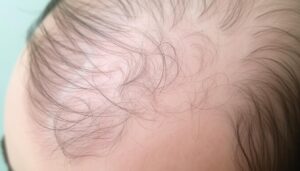Humira is a well-known medication for treating many autoimmune and inflammatory conditions. But, many people wonder if it can cause hair loss. It’s important to understand the link between Humira and hair loss to manage its side effects well.

Key Takeaways
- Humira, a widely-prescribed medication, may potentially cause hair loss.
- Factors like individual biology, underlying health conditions, and duration of Humira use can contribute to the likelihood of experiencing hair loss.
Understanding Humira and Its Potential Side Effects
Humira is a type of medicine called a biologic. It’s a TNF inhibitor. It’s used for treating conditions like rheumatoid arthritis, Crohn’s disease, and psoriasis. It works by lowering inflammation in the body.
Humira stops the action of TNF, a protein that causes inflammation. This helps reduce inflammation and ease symptoms in patients.
While Humira helps many people, it can have side effects. These effects can differ from person to person. Knowing about possible side effects, like hair loss, is important.
Does Humira Cause Hair Loss?
Can humira cause hair loss? Many people taking Humira worry about losing hair. This drug helps treat conditions like rheumatoid arthritis and psoriasis. Some studies suggest it might cause hair loss, but we don’t know for sure.
A few people taking Humira may lose hair, especially at the temples. This is called telogen effluvium, a common side effect of some drugs. It happens when the body reacts to the medication.
Factors Contributing to Hair Loss with Humira
Several things might make you lose hair while on Humira:
- Autoimmune response: Humira helps control the immune system. Sometimes, this can lead to an autoimmune attack on hair follicles, causing hair to fall out.
- Stress and inflammation: Humira can reduce inflammation but might also cause stress. This stress can disrupt hair growth.
- Individual sensitivity: Some people might be more likely to lose hair from Humira because of their genes or body type.
Solutions
If you are currently experiencing hair loss while using Humira, there are options to consider. One possible solution is Scalp Micropigmentation (SMP), a non-invasive procedure that can help address the appearance of hair loss. SMP involves micro-needles tattooing pigment into the scalp to create the illusion of a fuller head of hair. It is a safe and effective option for individuals looking to restore their confidence and improve their physical appearance.
Conclusion
Does humira cause hair loss? The link between Humira and hair loss is something to think about for those using this drug. Hair loss can happen, but it affects people differently. If you ar experiencing hair loss, scalp micropigmentation might be the solution fo you!
Hair loss can have some serious effects on a person’s confidence and happiness. If you find yourself to be staring in the mirror, horrified at the look of your head, consider ScalpMasters. We at ScalpMasters understand the stress and anxiety you might be dealing with as the look of your hair diminishes, which is why we offer the best solutions.
SMP is a surefire way to get you back to feeling like yourself and replenish your look! Contact us today for a consultation, and never let the lack of hair bring you down again!
Come visit ScalpMasters to start your journey with SMP!










